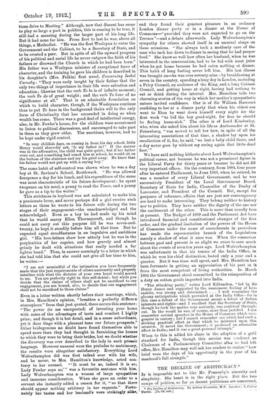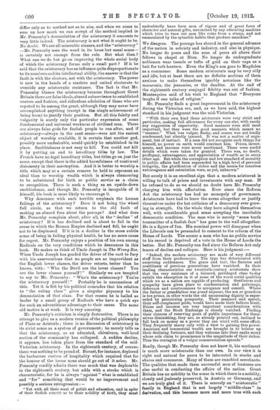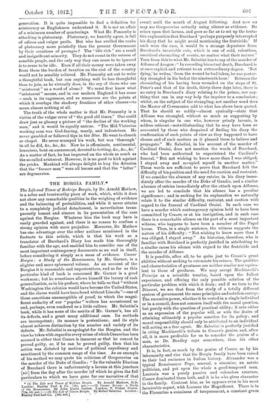THE DECLINE OF ARISTOCRACY.• Pe is impossible not to like
Mr. Ponsonby's sincerity -and simplicity. His heart is in the right place. But the two camps of politics, so far as decent politicians are concerned,
• me Decline of Aristocracy. By Arthur Potscarby, M.P. London : T. Fisher Merin. [7s. ed. net.] differ only as to method not as to aim, and when we come to sum up how much we can accept of the method implied in Mr. Ponsonby's denunciation of the aristocracy it amounts to very little indeed. The aristocracy is not what it ought to be. No doubt. We are all miserable sinners, and the " aristocracy" —Mr. Ponsonby uses the word in its loose but usual sense— is certainly not exempt from the rule. But what then ? What can we do but go on improving the whole social body of which the aristocracy forms only a small part ? If it be said that the aristocracy has an influence quite disproportionate to its numbers and its intellectual ability, the answer is that the fault is with the electors, not with the aristocracy. The power is now in the hands of a resolute and united electorate to override any aristocratic resistance. The fact is that Mr. Ponsonby blames the -aristocracy because throughout Great Britain there are false ideals, absurd subservience to established custom and fashion, and ridiculous adulation of those who are reputed to be among the great, although they may never have accomplished Anything (except hi thie.,Single achievement of being born) to justify their position. But all this falsity and vulgarity is surely only the particular expression of some fundamental and universal weakness of civilized men. There are always false gods for foolish people to run after, and if aristocracy—always in the cant sense—were not the easiest object of worship available, it is certain that another god, possibly more undesirable, would quickly be established in ita place. Snobbishness is not easy to kill. You could not kill it by putting an end to hereditary titles by law. The French have no legal hereditary titles, but titles go on just the same, except that there is the added harmfulness of continual dishonesty in their assumption. And it is better to worship a title which may at a certain remove be held to represent an ideal than to worship wealth which is always clamouring to be substituted for birth or public service as a claim to recognition. There is such a thing as an upside-down snobbishness, and though Mr. Ponsonby is incapable of it himself, his book is most likely to encourage it.
• Why denounce with such terrible emphasis the human failings of the aristocracy ? Does it not bring the wheel full circle, so that we return to the old fault of making an absurd fuss about the peerage ? And what does Mr. Ponsonby complain about, after all, in the " decline " of aristocracy ? If it has declined and is about to fall in the sense in which the Roman Empire declined and fell, he ought not to be displeased. If it is in a decline in the more subtle sense of being in failing physical health, he has no more cause for regret. Mr. Ponsonby enjoys a position of his own among Radicals on the very conditions which be denounces in this book. He makes us think of Uncle Joseph in The Wrong Box, When Uncle Joseph has goaded the driver of the cart to fury with his asseverations that no people are so improvident as the English lower classes, the driver retorts, better than he knows, with : " Who the Devil are the lower classes ? You are the lower classes yourself !" Similarly we are tempted to say to Mr. Ponsonby : " Who's the aristocracy? You're the aristocracy yourself !" Probably he is unconscious of this. Yet it is felt by his political comrades that his relation to " the ruling class " gives a singular piquancy to his denunciation of that class. For that reason he is hailed as leader by a small group of Radicals who have a quick eye for such an adventitious advantage to their cause. The same -old motive is at work. It is very amusing.
Mr. Ponsonby's criticism is simply destructive. There is no attempt to give us a modern version of the political philosophy of Plato or Aristotle ; there is no discussion of aristocracy in its strict sense as a system of government; he merely tells us that the aristocracy, as an educated, chivalrous, well-bred section of the community has collapsed. A sudden decline, it appears, has taken place from the standard of the mid- Victorian aristocracy. In the eighteenth century, of course, there was nothing to be proud of. Burnet, for instance, deplored the barbarous custom of hospitality which required that for the honour of the house none should go out of it sober. Mr. Ponsonby readily admits there was much that was deplorable in the eighteenth century, but adds with a stroke which is characteristic, for be is always " against" what is established and "for" something that would be no improvement and possibly a serious retrogression :-
"Yet with all their want of polish and ednoation, and in spite of their foolish conceit as to their nobility of birth, they must
undoubtedly have been men of vigour and of great force of character and natural gifts, untouched by any educating machine which tries to turn out men like coins from a stamp, and not emasculated by the sybaritic habits that produce manikins."
We disagree. The peerage has shared in the general advance of the nation in sobriety and industry, and also in physique. No longer do peers and the sons of peers sit above their fellows in chapel at Eton. No longer do undergraduate noblemen wear tassels or tufts of gold on their caps as a bait for tuft-hunters. Even the King's son goes to Magdalen as a commoner. Some modern aristocrats may be very silly and idle, but at least there are no definite sections of them anxious to make themselves ignobly notorious like the macaronis, the jessamies, or the dandies. At the end of the eighteenth century conjugal fidelity was out of fashion.
Montesquieu said of his visit to England that "Everyone laughs if one talks of religion."
Mr. Ponsonby finds a great improvement in the aristocracy during the Victorian era, and, as we have said, the highest standard in his judgment was the mid-Victorian.
" With their own kind these aristocrats were very strict and particular, making full allowances for every one else, with rarely any suggestion of superiority. Good manners were still most important, but they were the good manners which meant no
manner." What was vulgar, flashy, and coarse was not loudly condemned, but silently ignored. It was not a matter of argu- ment, but of instinct. If a man did not recognize such things for himself, no power on earth would convince him. Prices, invest- ments, and incomes were never mentioned. These were sordid details which were taken for granted. There was, no doubt, profligacy, extravagance, and appreciation of wealth as in every other age. But while the corruption and low standard of morality in public affairs had been superseded by a high level of personal integrity, the glorification of riches and Ap mania for senseless extravagance and ostentation were, as yet, unknown."
But surely it is an excellent sign that a modern aristocrat is willing to talk of prices and investments with any man. If he refused to do so we should no doubt have Mr. Ponsonby charging him with affectation. Ever since the Reform Act the aristocracy has had no monopoly of governance. Aristocrats have had to leave the arena altogether or justify themselves under the hot criticism of a democracy ever grow-
ing in strength. On the whole they have adapted themselves well, with considerable good sense accepting the inevitable democratic condition. The man who is merely "some. tenth transmitter of a foolish face" has gone to the wall altogether. He is a figure of fun. His nominal power will disappear when the Liberals can be persuaded to consent to the reform of the House of Lords. The sooner a man who has no public service to his record is deprived of a vote in the House of Lords the better. But Mr. Ponsonby can find since the Reform Act only traces of decline and collapse. Here is his judgment:—
"Indeed, the modern aristocracy are made of very different stuff from their predecessors. The type has deteriorated with surprising suddenness. The grace and tact, the fineness and courtliness of previous generations have vanished. In their leading characteristics our twentieth-century aristocrats show that the very existence of a leisured, privileged class to-day entails the absorption in it of some of the worst social qualities which we as a nation are capable of producing. Gentleness and sympathy have given place to condescension and patronage, deference and courteousness to arrogance and conceit. Where the father or grandfather was grand seigneur, the son or grandson is bon prince, in other words the old unassuming dignity is super- seded by patronizing pomposity. Their manners and speech, their self-complacent pride, would have made their fathers blush. Prices and incomes are very important considerations with them, and the Stock Exchange is closely watched. Finding their chances of reserving posts of public importance for them- selves diminishing, they are, as already pointed out inclined to fall back on money as a power they can wield with some effect. They frequently marry only with a view to gaining this power. American and commercial wealth are brought in to bolster up their declining fortunes, and they welcome into their ranks many whose sole claim to prominence is the magnitude of their riches. Thus the contagion of a vulgar commercialism spreads."
Really, though Mr. Ponsonby does not know it, his sentiment is much more aristocratic than our own. In our view it is right and natural for peers to be interested in stocks and shares and commerce. Many of them are ennobled merchants.
The qualities that made them successful men of business are also useful in conducting the affairs of the nation. Great Britain has no nobility in the sense in which there is a nobility, closely and jealously preserved, in Austria or Germany, and we are truly glad of it. Thera is scarcely an " aristocratic " family in England that is not largely " middle-class " "in derivation, and this becomes more and more true with each
:generation. It is quite impossible to find a definition for aristocracy as Englishmen understand it. It is not an affair' of a minimum number of quarterings. What Mr. Ponsonby is attacking is plutocracy. Plutocrat-7, we heartily agree, is full of odious and vulgar perils: But who has swelled the ranks of plutocracy more pointedly than the present Government by their creations of peerages The " idle rich " are a small and insignificant minority. They do not count in the esteem of sensible people, and the only way they can cease to be ignored as to cease to be idle. Even if all their money were taken away from them the burden of taxation on the rest of the country -would not he sensibly relieved. Mr. Ponsonby set out to write a thoughtful book, but can anything well be less thoughtful than to join, as he virtually does, in the cry of those who use " aristocrat " as a word of abuse ? We must first know what "aristocrat" means, and in our modern England it has come — such is its vagueness, and so numerous are the points at which it overlaps the shadowy frontiers of other classes—to mean almost nothing at all.
The truth of the whole matter is that Mr. Ponsonby is a victim of the vulgar error of " the good old times." One could draw just as gloomy a picture of " the decline of the working man," and it would be equally untrue. "The Mid-Victorian working man was God-fearing, manly, and industrious. He never gambled or followed tips in the Star. He went to church or chapel. He never stamped his work, but was thorough' in all he did, etc., &c., &c. Now he is effeminate, sentimental, luxurious, bent on amusement, devoted to betting, &c., &c." As a matter of fact, he has improved on the whole as much as the so-called aristocrat. However, it is no good to kick against the pricks. Mankind will always delight to hug the delusion that the "former men" were all heroes and that the " latter " are degenerates.
















































 Previous page
Previous page